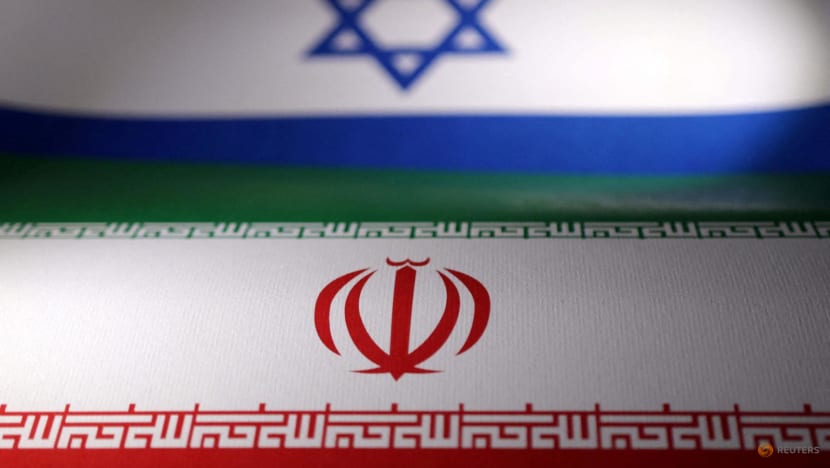Advertisement

Israeli and Iranian flags are seen in this illustration taken, Apr 24, 2024. (Photo: REUTERS/Dado Ruvic/Illustration/File)
27 Oct 2024 05:44AM (Updated: 27 Oct 2024 06:28AM)
JERUSALEM: Israel struck several military facilities in Iran on Saturday (Oct 26), marking the latest exchange in the hostilities between the two longstanding adversaries in a conflict that has simmered for months.
Israel’s strikes were in retaliation for the Oct 1 attack by Iran, when Tehran fired about 200 missiles at Israel, though most were intercepted by the country’s aerial defence systems.
Experts AFP spoke to characterised Israel’s latest strikes as a calculated show of force in a conflict that has long threatened to engulf the region.
However, they believe a broader escalation into a regional war remains unlikely.
WHAT’S THE STRATEGY?
By hitting Iran’s missile factories, Israel is likely hoping to blunt a potent weapon the Islamic Republic has used against the country in recent months.
Iran has hit Israel directly two times this year – once in April and the other time on Oct 1 – with massive missile barrages that were mostly neutralised by Israeli air defence.
However, some missiles were able to slip through.
“The goal, in my opinion, is to strike Iran’s missile-production industry to decrease one of the main threats to Israel, while also increasing Israel’s freedom of operation by attacking Iran’s air defences,” Michael Horowitz, an expert with the Le Beck security consultancy, told AFP.
There were also no reports of mass civilian casualties or damage to the Iran’s economic infrastructure, which may provide a route for de-escalation between the two foes while earning Israel praise from its US backers.
“Israel has made a media and political coup and not a military one. It expects rewards from Washington for the moderate nature of its attack,” said Hasni Abidi, director of the Centre for Studies and Research for the Arab and Mediterranean World in Geneva.
“At the same time, Israel has conducted a real test of the level of capacity reached by Iranian defence,” Abidi added.
WHAT’S THE IMPACT?
Experts also suggested that the Israeli attack aimed to showcase the country’s ability to retaliate against Iran with a complex operation using precise firepower.
“From Israel’s point of view, it is a huge demonstration of capabilities,” said Sima Shine, an Iran specialist at the Institute for National Security Studies (INSS) in Tel Aviv.
“I think it is the first time that many, many airplanes were flying to Iran, attacking in Iran, (and) coming back safely.”
Joost Hiltermann, Middle East programme director at the International Crisis Group, said the Israeli show of force also left Iran more vulnerable.
“The importance of attacking Iran’s air defences is that in a next round Iran would be largely undefended,” he told AFP.
Danny Critinowicz, another Iran expert at the INSS, believes that Israel’s ability to conduct largely umimpeded strikes stems from its successful efforts to weaken Hezbollah, Iran’s key ally in Lebanon.
“It was really the protecting wall of Iran, and the fact that Hezbollah is quite weak in its war on Israel, I think changes Israel’s calculus regarding attacking directly in Iran,” he said.
“This is a direct consequence of that.”
WHAT NEXT?
Though Critinowicz called the attack “unprecedented” and “historical” by breaking the taboo of a direct attack on Iran’s military on its soil, he said escalation into a full-blown regional war was unlikely.
Explosions in April shook Iran’s Isfahan province in what US officials, cited by American media, said was Israeli retaliation, though Israel never publicly acknowledged its responsibility.
“Nobody wants to find themselves in a regional war,” he told AFP, adding that Iran’s minimising of the attack’s impact was a way to defuse tensions.
“Iran shows a lot of flexibility when they don’t want to do something… they know how to find the right excuses.”
However, he said that the strikes “can be a preview for what could happen in the future”.
“Since the Iran-Iraq war, Tehran has not suffered such attacks on its territory … Iran’s leaders are obviously not interested in a regional war,” Critinowicz said.
“The ball now is in the hands of the Iranian leadership, which has committed in the past to an immediate response to any significant Israeli attack.”
Hiltermann of the ICG said Israel was also under US pressure to reduce the possibility of more escalation.
“The US doesn’t want a wider war and made clear to Israel what it expected,” he said.
Shine also pointed to the United States’ role and said “Israel and the US have also transmitted different messages to Iran not to retaliate to close the cycle of attacks”.
Still, she pointed to Iran’s own capacities should it choose to retaliate, saying it still had a stockpile of ballistic and other missiles.
“But as they have seen the previous two times, there is a very effective defence system” in Israel, she said.
“They have more interest in closing this cycle than opening it.”
